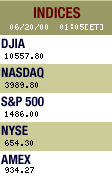| Corporate Financial Healthcare Technology | |
| Stock of the Day Tip of the Day Periscope | |
 for more information | |
|
UPDATE 1-U.S. mulls releasing emergency oil
At the Democratic National Convention in Los Angeles,
Richardson said a decision on whether or not to swap oil from the
SPR with energy firms was premature, but acknowledged many
options for alleviating steep oil prices were being considered.
"No decision has been made and the president is the one to
make those decisions,'' Richardson told Reuters. "There are a
lot of options being talked about but nothing's being
considered right now. It's premature.''
Traders and analysts said on Monday Richardson raised the
possibility of oil swaps from the emergency stockpile, which
currently holds 570.4 million barrels of crude, during a meeting
in New York City on Friday with oil analysts.
Oil prices on Monday rose nearly $1 on the New York
Mercantile Exchange (NYMEX), to $31.94 a barrel. Richardson
reiterated he believes oil prices should be in the "low-20's'' and
that prices topping $30 a barrel are too high.
Industry expert Philip Verleger, who attended Friday's
meeting, said he argued for Richardson to open the reserve to oil
swaps, saying they would limit wild swings in futures oil prices
that have touched to decade-high levels in recent months.
Richardson discussed options for releasing SPR oil but the
spirit of the meeting did not suggest a release was imminent,
said another analyst who attended the meeting but asked not to
be identified. An Energy Department spokesman confirmed the
meeting took place, but would not give details.
Without elaborating on the meeting, Richardson said he
would like to see increased world oil production and was
concerned with low heating oil stocks ahead of expected strong
winter demand.
"We hope that OPEC countries do keep an open mind about
increased production when they meet again,'' Richardson said,
referring to an Organization of Petroleum Exporting Countries
(OPEC) September summit.
"But again we're concerned. The international market
clearly needs more oil,'' he added. Richardson said he objected
to Venezuela President Hugo Chavez's comments that oil prices
should not fall from current prices and any decline would be a
''death sentence'' for producers, such as Venezuela.
The Energy Department last year hatched the idea of
swapping oil from the Strategic Petroleum Reserve. White House
economists rejected the plan on the grounds that it would
interfere with the free market and influence oil prices.
Under the plan, firms would borrow SPR oil and then sell it
in the open market, increasing supplies and pushing down crude
prices. The firms would replace the initial oil loaned at a later
date, plus extra barrels, after prices fell.
The administration has come under pressure from some
members of Congress, especially in this election year, to
release oil from the reserve this past winter to lower heating
oil prices and this summer to push down gasoline prices.
Verleger said the swaps plan would help increase heating
oil and gasoline inventories.
The administration is setting up a separate heating oil
reserve for the Northeast to avoid supply disruptions in the
region this upcoming winter. Richardson has said the 2 million
barrel reserve would only be used in a supply emergency and not
to control heating oil prices.
| ||
|
© , Fox Market Wire. All Rights Reserved Sitemap | Terms |